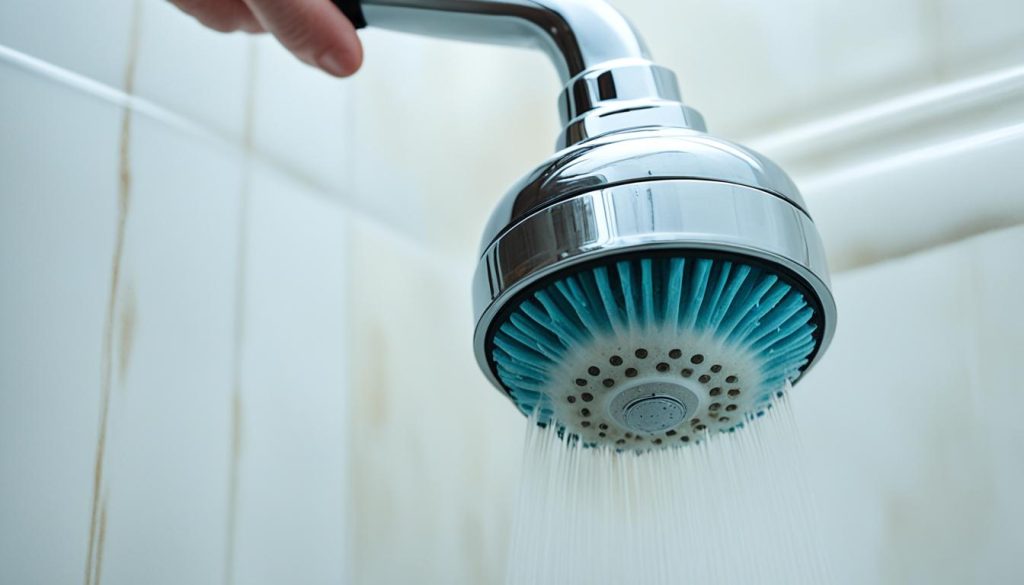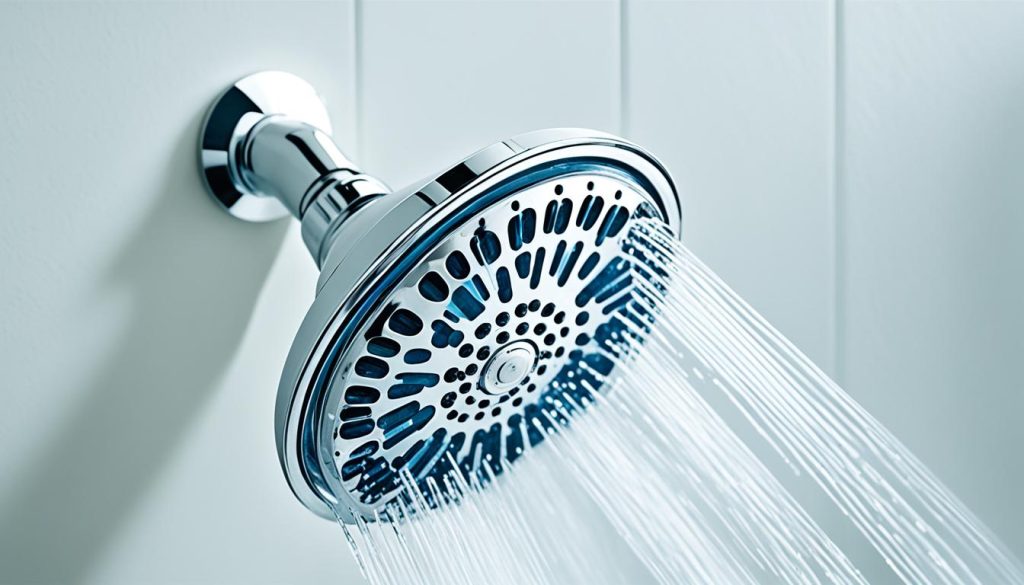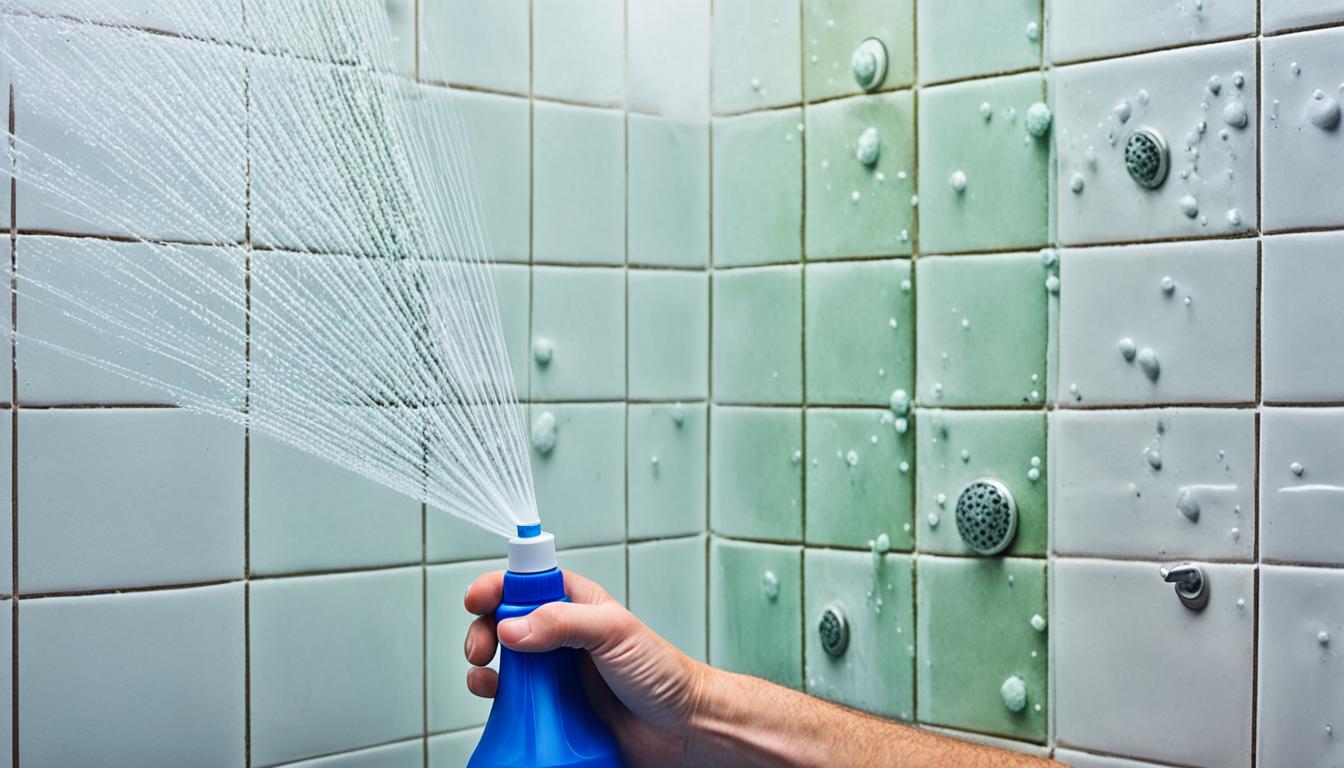Did you know that hard water stains can affect up to 85% of households in Canada? That’s right, these stubborn deposits can wreak havoc on your shower surfaces, leaving unsightly marks and ruining the overall cleanliness of your bathroom. But fear not! In this article, I will share with you effective methods and tips on how to clean hard water stains in your shower, ensuring that your bathroom stays spotless and sparkling.
Key Takeaways:
- Hard water stains are a common issue in Canadian households, affecting up to 85% of homes.
- With the right methods and products, you can effectively remove hard water stains from your shower.
- Different surfaces require specialized cleaning techniques for optimal results.
- Prevention and maintenance are key to keeping hard water stains at bay.
- Choose eco-friendly cleaning products to protect both your health and the environment.
Understanding Hard Water Stains and Their Causes
Water stains, also known as water spots, are dried mineral deposits that appear on surfaces after water has evaporated. These stains can be caused by various minerals present in the water, such as magnesium, calcium, iron, or manganese. Hard water, which has a high mineral content, is the main culprit for most water stains.
When hard water evaporates, it leaves behind mineral deposits that create unsightly stains on various surfaces. These stains can be especially problematic in the shower, where they can accumulate over time, making it difficult to maintain a clean and fresh appearance.
Hard water stains, often seen as white or grayish deposits, can be found on shower doors, tiles, faucets, and even showerheads. They can make your shower look unappealing and can be challenging to remove without proper knowledge and cleaning techniques.
To effectively remove and prevent hard water stains in your shower, it is crucial to understand the underlying causes. By knowing the makeup of hard water and the minerals it contains, you can tackle the issue at its source and maintain a spotless shower.
The Causes of Hard Water Stains
Hard water stains are primarily caused by the high level of minerals present in hard water. Let’s take a closer look at the common minerals found in hard water and their contributions to water stains:
| Mineral | Contribution to Water Stains |
|---|---|
| Magnesium | Leaves a grayish-white buildup |
| Calcium | Forms white, chalky deposits |
| Iron | Creates orange, reddish-brown stains |
| Manganese | Produces black and brown stains |
These minerals are commonly found in groundwater sources and make their way into household plumbing systems. When the water is heated, or it evaporates, the minerals are left behind on surfaces, resulting in hard water stains.
In the next section, I will introduce effective DIY methods for removing hard water stains in your shower. These methods use common household ingredients and can help restore the sparkle to your shower surfaces.
DIY Methods for Removing Hard Water Stains
Are hard water stains ruining the appearance of your shower? Don’t worry, there are DIY methods you can try to effectively remove those stubborn stains without harsh chemicals. Let me share some tried and tested remedies with you:
1. Baking Soda Paste
Baking soda is a versatile ingredient that can be used for various cleaning purposes, including removing hard water stains. To create a paste, mix baking soda with water until it forms a thick consistency. Apply the paste directly to the stains, then scrub gently with a brush or sponge. Rinse with water and see the stains disappear!
2. Vinegar Solution
Vinegar is a natural acid that can dissolve hard water stains. You can use it alone or combine it with other ingredients for added effectiveness. To use vinegar alone, soak a cloth or sponge in vinegar and wipe down the stained areas. For tougher stains, mix equal parts vinegar and water in a spray bottle, then spray onto the stains. Leave it for a few minutes, scrub, and rinse.
3. Hydrogen Peroxide-Based Disinfectants
Hydrogen peroxide is another effective solution for removing hard water stains. Look for hydrogen peroxide-based disinfectants specifically formulated for tackling mineral deposits. Apply the disinfectant to the stained areas, let it sit for a few minutes, then scrub and rinse thoroughly.
4. CLR Pro Spray Cleaner
If you prefer a ready-to-use product, CLR Pro Spray Cleaner is an excellent choice. It is specially designed to eliminate hard water stains, soap scum, and other tough grime. Simply spray the cleaner on the stains, wait for a few minutes, scrub if needed, and rinse. This powerful cleaner can give you impressive results in no time.
Remember, always test any cleaning solution on a small, inconspicuous area before applying it to the entire surface. This will ensure that the solution does not damage or discolor your shower. With these DIY methods and the right products, you can say goodbye to hard water stains and enjoy a sparkling clean shower!

Specialized Cleaning for Different Shower Surfaces
When it comes to cleaning hard water stains, different shower surfaces require specific methods and products for effective removal. In this section, I will provide you with detailed guidelines on how to clean shower and tub surfaces, shower heads and faucets, glass surfaces, toilets, and even dishes. By following these tips, you can ensure that each surface in your bathroom stays spotless and free from stubborn hard water stains.
Cleaning Shower and Tub Surfaces
To clean shower and tub surfaces, start by mixing equal parts of white vinegar and water in a spray bottle. Spray the solution onto the surfaces and let it sit for a few minutes to break down the hard water stains. Then, scrub the surfaces with a soft brush or sponge and rinse thoroughly. For tougher stains, you can create a paste using baking soda and water, apply it to the stains, and scrub gently before rinsing.
Cleaning Shower Heads and Faucets
Shower heads and faucets can easily accumulate hard water deposits, affecting their performance and appearance. To clean them, fill a plastic bag with white vinegar and secure it around the showerhead or faucet using a rubber band. Let it soak for a couple of hours, then remove the bag and scrub the surface with an old toothbrush. Rinse with water to reveal a clean and shiny fixture.
Cleaning Glass Surfaces
Glass surfaces, such as shower doors and partitions, can develop stubborn hard water stains over time. To tackle these stains, you can create a cleaning solution using equal parts of water and vinegar. Spray the solution onto the glass and let it sit for a few minutes. Then, wipe the glass with a microfiber cloth or sponge and rinse thoroughly. For added shine, you can buff the glass with a dry cloth or newspaper.
Cleaning Toilets
To remove hard water stains from toilets, start by pouring a cup of white vinegar into the bowl. Let the vinegar sit for an hour or overnight to break down the stains. Then, scrub the toilet bowl with a toilet brush to remove any residue. For extra cleaning power, you can sprinkle baking soda inside the bowl before scrubbing. Finish by flushing the toilet to reveal a clean and stain-free bowl.
Cleaning Dishes
Hard water stains can also affect your dishes, leaving spots and residue behind. To combat this, add white vinegar to your dishwasher’s rinse aid compartment or place a dishwasher-safe bowl filled with vinegar on the top rack of an empty dishwasher. Run a regular cycle to remove hard water stains from your dishes. You can also soak dishes in a sink filled with equal parts of water and vinegar for an hour before washing them as usual.
| Surface | Cleaning Method |
|---|---|
| Shower and Tub Surfaces | Mix equal parts of white vinegar and water in a spray bottle. Spray onto surfaces, scrub, and rinse. |
| Shower Heads and Faucets | Fill a plastic bag with vinegar, secure it around the fixture, let it soak, scrub, and rinse. |
| Glass Surfaces | Mix equal parts of water and vinegar in a spray bottle. Spray onto glass, wipe, and rinse. |
| Toilets | Pour vinegar into the bowl, let it sit, scrub, and flush. |
| Dishes | Add vinegar to the dishwasher’s rinse aid compartment or soak dishes in water and vinegar mixture before washing. |
Prevention and Maintenance Tips for Hard Water Stains
Preventing hard water stains is essential to maintain a clean and spotless shower. By implementing a few preventive measures and following a regular maintenance routine, you can minimize the occurrence of hard water stains and keep your shower looking its best. Here are some effective tips to prevent and maintain hard water stains:
- Use water softeners: Installing a water softener can help reduce the mineral content in your water, preventing the formation of hard water stains. Consider investing in a quality water softener system to enjoy cleaner showers.
- Seal surfaces periodically: Applying a sealant to your shower surfaces can create a protective barrier that makes it harder for minerals to adhere. Be sure to follow the manufacturer’s instructions when applying the sealant.
- Implement regular cleaning routines: Establish a cleaning routine that includes regular maintenance to prevent hard water stains from building up. Consistency is key when it comes to keeping your shower free from stains.
- Wipe down surfaces after each use: After every shower, take a few minutes to wipe down the surfaces with a microfiber cloth or squeegee. This will help remove any water droplets that can contribute to the formation of hard water stains.
By incorporating these prevention and maintenance tips into your shower care routine, you can significantly reduce the occurrence of hard water stains and keep your shower looking clean and fresh.

Recommended Cleaning Frequency for Showers
While prevention is key, it’s also important to maintain a regular cleaning schedule to keep your shower in top condition. The frequency of cleaning will depend on the level of hard water in your area and how often the shower is used. Here’s a general guideline for cleaning frequency:
| Frequency | Tasks |
|---|---|
| Weekly | Wiping down surfaces, removing soap scum, and cleaning fixtures |
| Monthly | Deep cleaning shower tiles and grout, descaling showerheads |
| Quarterly | Sealing shower surfaces, checking water softener system |
Following a consistent cleaning routine will help prevent the buildup of hard water stains and keep your shower sparkling clean.
Choose the Right Products for Effective and Eco-Friendly Cleaning
When it comes to removing hard water stains in your shower, choosing the right cleaning products can make all the difference. The market is filled with options, but the best shower cleaners for tackling hard water stains are those that provide effective results without harming the environment. Luckily, there are eco-friendly cleaning products and natural remedies available that can get the job done.
Opting for eco-friendly cleaning products ensures that you are not only removing hard water stains effectively but also protecting the planet. Look for non-toxic cleaners that are made from natural ingredients and free from harsh chemicals. These products not only provide a safer cleaning experience for you and your family but also minimize the negative impact on aquatic life and the environment.
When dealing with specific surfaces like granite and marble, it’s important to consider the impact of soap buildup. Soap scum can dull the shine and discolor these surfaces over time. To clean granite and marble without damaging their natural beauty and seal, use a pH-neutral cleaner specifically formulated for these materials. Avoid using abrasive cleaners or acidic solutions, as they can cause etching and permanent damage.
In conclusion, selecting the best shower cleaners, eco-friendly cleaning products, and natural remedies is essential for effective and safe removal of hard water stains. By using non-toxic cleaners, you can maintain a clean and healthy environment while achieving sparkling results. Additionally, understanding the impact of soap buildup on surfaces like granite and marble allows you to take the necessary steps to preserve their beauty for years to come.
